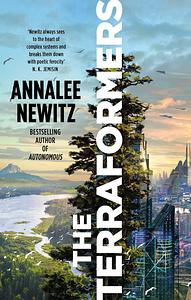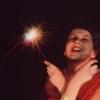Take a photo of a barcode or cover
I liked a lot about this that I already liked about „Autonomous“ - the big ideas, in this case about terraforming and personhood. But I got distracted by skepticism about the long lifespans that are needed to make the story work and the big hole of boredom the book falls into in its middle section.
I am still on the fence about the novel‘s very utopian presentation of progressive politics, all of which I support, but which sometimes feel so … lame when you read about them. I don’t mind enviromentalism, sex positivity or people introducing themselves with pronouns, but the ending especially makes such a cheesy, didactic case against hypercapitalism and for democracy, that it deflated a lot of the book for me. There must be more subtle, more personal ways to get these ideas across.
I am still on the fence about the novel‘s very utopian presentation of progressive politics, all of which I support, but which sometimes feel so … lame when you read about them. I don’t mind enviromentalism, sex positivity or people introducing themselves with pronouns, but the ending especially makes such a cheesy, didactic case against hypercapitalism and for democracy, that it deflated a lot of the book for me. There must be more subtle, more personal ways to get these ideas across.
The world-building was great, but the message was heavy handed from the start. Corporations = bad guys, save the environment, okay but this is like 50,000 years in the future, we still haven’t sorted this out?
challenging
reflective
slow-paced
Plot or Character Driven:
A mix
Strong character development:
No
Loveable characters:
No
Diverse cast of characters:
Yes
Flaws of characters a main focus:
No
adventurous
challenging
dark
emotional
funny
hopeful
informative
tense
slow-paced
Plot or Character Driven:
A mix
Strong character development:
Yes
Loveable characters:
Yes
Diverse cast of characters:
Yes
Flaws of characters a main focus:
Yes
I'm no literary expert but you know a masterpiece when you read it and this is a masterpiece.
adventurous
emotional
informative
inspiring
reflective
medium-paced
Plot or Character Driven:
A mix
Strong character development:
No
Loveable characters:
Complicated
Diverse cast of characters:
Yes
Flaws of characters a main focus:
No
adventurous
challenging
hopeful
informative
inspiring
medium-paced
Plot or Character Driven:
A mix
Strong character development:
Yes
Loveable characters:
Complicated
Diverse cast of characters:
Yes
Flaws of characters a main focus:
No
..researchers found the H. sapiens germline in a seventy-thousand-year-old biobank that had been moldering in the museum basement. Nobody is really sure what the biobank was for, but archaeologists think it probably had some kind of ritual use. Back then, people had all kinds of superstitions about their genomes. They would send their genetic material to this biobank, and analysts would tell their fortunes by grouping them into categories like ‘West African’ or ‘European’ or ‘Indigenous American.’ [loc. 5568]
Told in three parts, The Terraformers is set in the far future, on a planet known as Sask-E. The terraformers are employees (or perhaps slaves) of Verdance, an interstellar corporation whose goal is to recreate Pleistocene-era Earth -- before the Great Bargain which endowed some non-human animals with human-level intelligence (subject to certain controls) and averted ecological catastrophe. It was at this mythical time that the Environmental Rescue Team (ERT) was formed, its remit to manage ecosystems.
The first third of the novel, 'Settlers', is the story of ERT Ranger Destry and her companion Whistle. (Who is a moose. Who can fly.) Destry and Whistle discover a subterranean city inhabited by the original terraformers, all Homo Diversus -- a generic term for customised hominin builds who were designed to perform the earliest stages of the terraforming process. They prefer to call themselves Archaeans, and they're unimpressed with Verdance.
The second part of the novel, 'Public Works', is set some centuries later and deals with a team trying to design a public transit system, despite Verdance's best efforts to keep the unwashed masses at bay. 'There would be excuses about how trains messed up the Pleistocene purity of Sasky, but really it would be about not wanting to deal with the class of person who took public transit.' (The moral of this section of the novel is 'always read the appendices to the planning reports'.) And the final third, 'Gentrification', deals with corporate greed and 'cleansing' of undesirables -- mostly non-human people, an ever-broadening category that includes the section's protagonists, a cat named Moose who works as an investigative journalist and a flying train named Scrubjack. Verdance has always intended Sask-E to be a place where H. Sapiens can reign supreme, just as it was before the Great Bargain...
There is a lot in this novel. Many of the little details of worldbuilding (such as swearing and profanity being scatalogical rather than sexual; such as robot kink bars) have stuck with me. But The Terraformers is not only a novel about the far future, it is a novel about now: what makes a person a person? Does a small vocabulary -- Whistle can only speak in one-syllable words, as per design -- mean a person is unintelligent? Can people be owned? How do revolutions happen? Is authenticity another name for prejudice? Are all corporations evil?
For me this was an engaging and richly detailed novel -- or rather, three linked novellas -- though I did not engage with (or like) all the protagonists, and some of the plot turns seemed to depend on people making improbably poor and/or draconian decisions. Newitz, who's also a professional science journalist, presents scientific ideas clearly, and the relationships at the core of each part of the novel are just as vivid as the futuristic sciences.
Kim Stanley Robinson, author of many geoengineering epics, told me (jokingly) that he would permit me to write about terraforming as long as I included a character named Kim, and so I have. [loc 5939]
Graphic: Sexual content
Moderate: Slavery, Murder
You either like Annalee Newitz or you don't. They are uniquely both subtle and in your face about class, capitalism, and the surveillance state. They’re both angry and optimistic, jaded and sweetly innocent, incredibly complicated and devastatingly simple.
Personally, I love the imagination and audacity of their storytelling and all the competing ideas and feelings they brings to the table. I like the way they write, and I like the way their books engage me on so many levels.
In this ancient northern city, survivors of the Lefthand Massacre weren't simply traumatized refugees. They became memes that hurtled across the galaxy. And the story of their experiences became cosmic radiation, ripping minuscule but dangerous holes in structures of power that had stood for thousands of years.
Personally, I love the imagination and audacity of their storytelling and all the competing ideas and feelings they brings to the table. I like the way they write, and I like the way their books engage me on so many levels.
In this ancient northern city, survivors of the Lefthand Massacre weren't simply traumatized refugees. They became memes that hurtled across the galaxy. And the story of their experiences became cosmic radiation, ripping minuscule but dangerous holes in structures of power that had stood for thousands of years.
inspiring
lighthearted
medium-paced
Plot or Character Driven:
Plot
Strong character development:
No
Loveable characters:
Complicated
Diverse cast of characters:
Yes
Flaws of characters a main focus:
No
That was… interesting.
I didn't love it — there was some silliness in the writing that reminded me of Heinlein (the parts of his writing I'm not so fond of such as a lot of his dialogue).
Very interesting concept. It's also more like three novellas in one book as the three main parts of the book follow the same overall story, but skip ahead in time. Speaking of time, the time scales involved are also interesting.
I didn't love it — there was some silliness in the writing that reminded me of Heinlein (the parts of his writing I'm not so fond of such as a lot of his dialogue).
Very interesting concept. It's also more like three novellas in one book as the three main parts of the book follow the same overall story, but skip ahead in time. Speaking of time, the time scales involved are also interesting.
adventurous
inspiring
reflective
tense
fast-paced
Plot or Character Driven:
A mix
Strong character development:
Yes
Loveable characters:
Yes
Diverse cast of characters:
Yes
Flaws of characters a main focus:
Yes
Even while reading this book, I was unsure how I was going to review it. It defied being defined early on and only every shook things up. Told over three generations (but 100s of years apart) it's a story about ecological rangers (and allies) who want a free planet and free people under their corporate owners. The only characters who stick around through all three eras are the rich elite, which is a powerful statement on its own. I've never read a book like this, focused on 'ranger issues' like how to deal with other peaceful settlements, how to ethically and ecologically build a mass transit system and how to deal with gentrification and corporate greed. A lot of the book takes place in meetings and discussions about infrastructure, in a way that I thought should have been boring. But the writing is top notch and I did end up loving all the characters (who are diverse in pretty much every way you can imagine, with some of the leads being flying moose and a literal sky train). I agreed with the ideas here, and appreciated the opening line when you meet new people across the world "Hey Friends!" which was very cute and didn't get old for me. This is a weird one, but I also enjoyed in a lot, in part for that weirdness.





